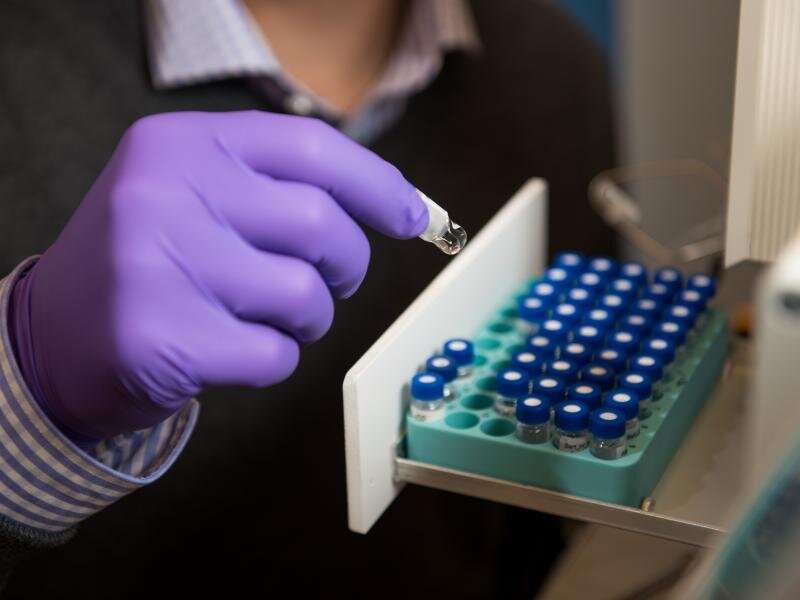As part of their research on the effects of vaping, scientists at PNNL and the University of Rochester Medical Center study the building blocks of proteins—called peptides—to identify which undergo changes and the possible impacts on biological processes and pathways. Credit: Andrea Starr, Pacific Northwest National Laboratory
Many of us make New Year's resolutions related to our health. We may vow to exercise more, eat better or lose weight. Some may decide to stop smoking or opt for electronic cigarettes, thinking they are a healthier alternative.
At the U.S. Department of Energy's Pacific Northwest National Laboratory (PNNL), researchers are collaborating on a first-of-its-kind study to learn more about the potential health effects of e-cigarettes. Teaming with the University of Rochester Medical Center, researchers are exploring whether vaping causes subtle changes in proteins at the molecular level that could contribute to disease or other health problems.
The scientists are examining how exposure to e-cigarettes can lead to an imbalance between two kinds of molecules: antioxidants and oxidants. When this imbalance is too great or persists for too long, the resulting state of "oxidative stress" can overwhelm natural repair processes. Excessive oxidative stress can pave the way for potentially harmful chain reactions linked to heart disease, cancer, respiratory disease, immune deficiency and other health conditions.
Early results reveal that exposure to e-cigarettes significantly reduced the lung's ability to use antioxidants to ward off those potentially harmful chain reactions, increasing the risk of infection or disease.
While previous studies have shown the direct effects of vaping on proteins and lung tissue to be modest, PNNL scientists are just beginning to investigate how vaping causes changes called "oxidative modifications" in proteins at the molecular level. They developed a novel biochemistry technique that makes it possible to measure the oxidation of proteins that would be challenging to detect using conventional approaches.
It is important to note that these kinds of molecular changes are not inherently good or bad for our health, even when they lead to oxidative stress. For example, exercising brings about temporary, mild oxidative stress that can stimulate processes that protect against infection and disease.
After observing oxidative stress in the lungs as a result of vaping, researchers used their technique, coupled with advanced mass spectrometry, to learn more about the molecular mechanisms underlying these changes. They discovered that certain proteins significantly shifted toward higher oxidation levels when exposed to e-cigarettes, even when there were no immediately discernable changes in lung structure or pulmonary inflammatory response. A shift in this direction could possibly affect quality control in other proteins and the effectiveness of the immune system. Interestingly, the team saw higher oxidation levels whether or not the vaping liquid contained nicotine.
Lung Stress
Scientists then took a closer look at the proteins along with the biological processes and pathways altered by e-cigarette exposure. They found an over-representation of proteins involved in inflammatory and immune response, which could indicate that frequent vaping may push lungs into a state of chronic stress. They also saw an increase in the production of blood proteins that are part of the body's defense during acute illness.
These results alone do not prove that e-cigarettes are bad for your health. However, they are shedding new light on how vaping could impact cellular functions at the molecular level.
Looking ahead, the team hopes to build on their approach. For example, by learning more about how e-cigarettes cause oxidative stress they could better understand which ingredients in vaping liquid are most responsible for that response. Future experiments could also take into consideration the duration and frequency of exposure to e-cigarettes. One day, this research could help lead to safer products or better inform consumers and regulators about potential health risks.
This collaborative study yielded interesting results, but there still is much to be learned. At PNNL, our researchers spend every day applying their broad expertise and advanced instruments to delve deeper and deliver new scientific knowledge in areas like this. Perhaps their insights may even shape your future New Year's resolutions.
Provided by Pacific Northwest National Laboratory
























